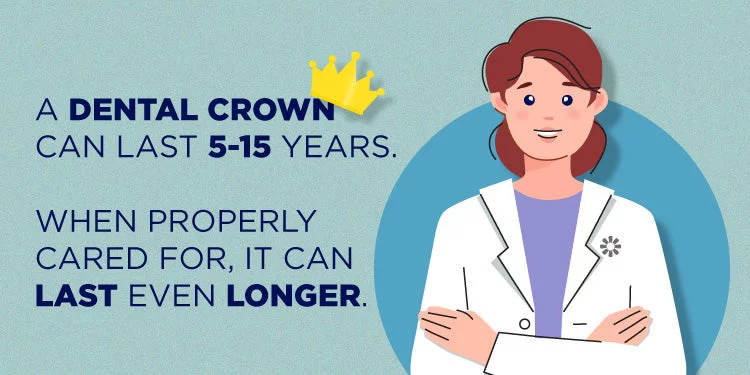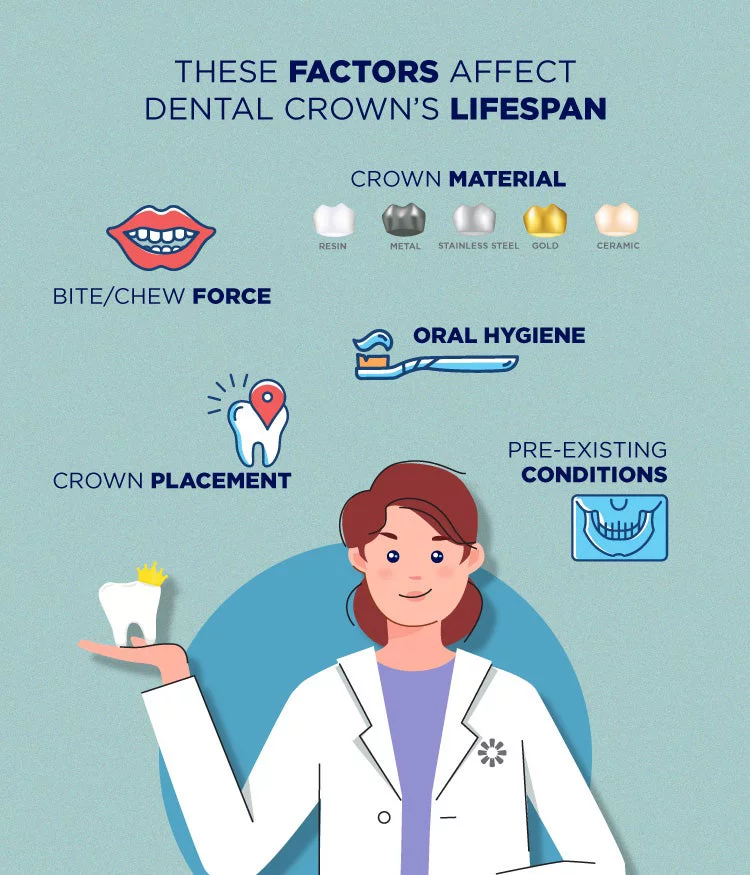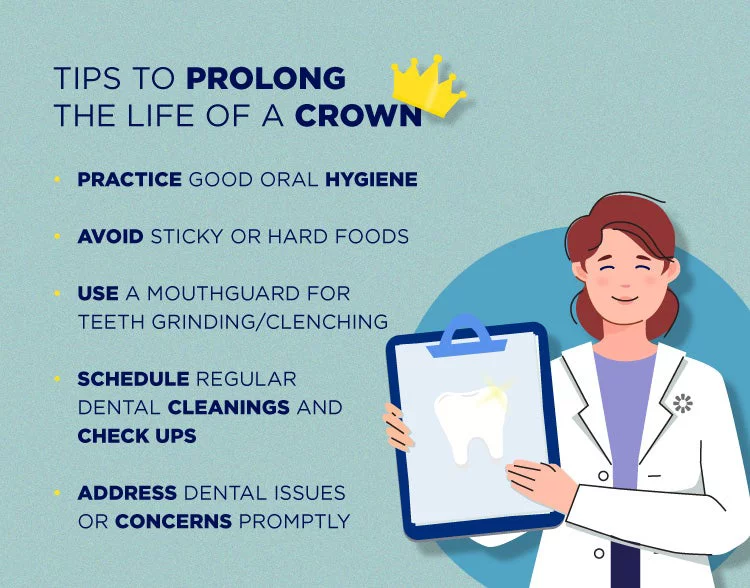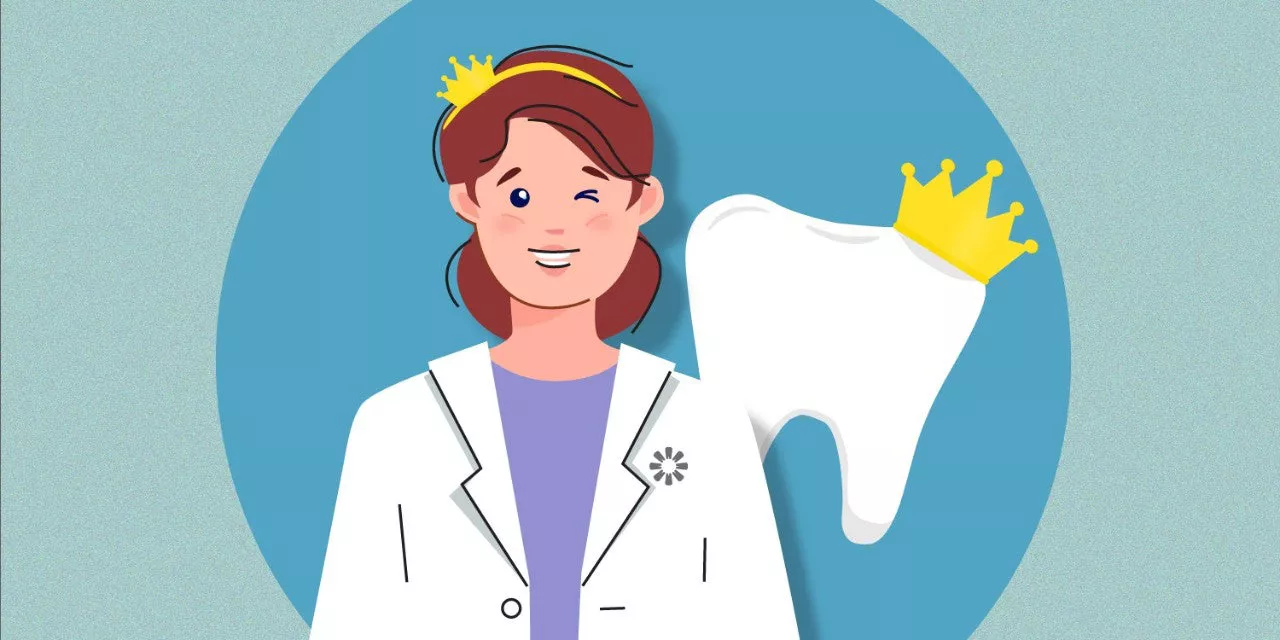Dental crowns cover, protect, and restore a damaged tooth when a typical filling cannot. A crown can last for years depending on multiple factors — mostly, how well the individual cares for their mouth.
How Long Does a Dental Crown Last?
People wonder how long a crown should last on a tooth. Can it last over 50 years, or even a lifetime? A crown can last an average of 5-15 years. When properly cared for, a crown can last even longer. Several of the biggest factors affecting a crown’s lifespan are how well a person practices oral hygiene habits, the typical daily wear and tear of the crown usually resulting from eating, and the quality of the crown's materials and placement.

How Long Does a Temporary Crown Last?
A temporary crown is a cap shaped like a tooth placed to protect a natural tooth or implant until a permanent crown is prepared and cemented into place. The temporary crown will be in place typically for two to three weeks. The length of time depends on the dental procedure that requires a crown, like covering an implant, a root canal, or a repaired tooth. It can be used for a single tooth or a bridge over multiple implants or teeth.
With implants, the bone could need a few weeks to a few months to heal before placing the crown.
Factors Affecting Dental Crown Lifespan

Material of the Crown
Crowns are made from various materials, including metal, porcelain-fused-to-metal, resin, porcelain, ceramic, or pressed ceramic.
- Metal crowns, typically made of chromium, gold, nickel, and palladium, tend to last the longest since they rarely break or chip and can withstand pressures from biting and chewing.
- Porcelain-fused-to-metal crowns have a more natural tooth color appearance, but the porcelain can break off or chip.
- Resin crowns can wear down and are more likely to break than porcelain-fused-to-metal crowns.
- Porcelain and ceramic crowns aren’t as strong as porcelain-fused-to-metal crowns. However, a pressed ceramic crown will last longer than an all-porcelain crown.
Bite and Chewing Forces
Like the effects of bruxism, biting and chewing too hard can damage the crown. The crown can crack or break and require dental treatment to replace it.
Poor Oral Hygiene Practices
Poor oral hygiene can wreak havoc on teeth and gums, eventually resulting in gum disease. Symptoms of gum disease include:
- Swollen, tender gums that easily bleed
- Infections around the gumline
- Bad breath
- Loose teeth leading to tooth loss
- Receding gums
- Painful chewing
- Gaps between teeth
- Misaligned bite
Pre-existing Dental Conditions
- Tooth infections
- Decay beneath the crown
- Tooth fracture beneath the crown
- Bruxism
Quality of the Crown Placement
A dental crown should fit your mouth’s bite pattern just like a natural tooth. If your bite feels “off,” then the crown wasn’t set correctly. That can cause jaw pain and headaches. If you feel pain when you bite down, that indicates that the crown was probably set too high on the tooth.
Prolonging the Life of a Dental Crown

Good Oral Hygiene Practices
A good oral hygiene regimen includes brushing at least twice a day, for two minutes at a time, using a soft-bristled brush. Be sure to pay attention to the gum line.
After brushing, floss your teeth daily to remove food particles and plaque. Also, consume a balanced diet while limiting sugary snacks and beverages. Don’t forget to schedule regular appointments with your dentist too.
Avoiding Certain Foods and Habits
Avoid chewing sticky foods such as caramel, gum, and chewy candies. These can negatively impact the crown’s lifespan by pulling at it. Also, avoid chewing hard foods that can break, crack, or damage a crown. These foods include popcorn kernels, hard raw vegetables like carrots and celery, hard candies, and ice. It is also not recommended to bite inanimate objects like fingernails. Lastly, don’t try to open bottles with your teeth.
Use a Mouthguard for Teeth Grinding or Clenching
Clenching and grinding cause forceful trauma. Repeating either action regularly can cause an existing dental crown to chip or crack, thus, necessitating a replacement. Many people often don’t know when they clench or grind their teeth since it commonly occurs when you’re sleeping. In that case, consult your dentist about obtaining a custom-made form-fitted mouthguard to wear when sleeping. This not only protects the crown but protects the remaining natural teeth from harm too.
Regular Dental Cleanings and Check-ups
Seeing a dentist for regular cleanings and check-ups is an important aspect of any oral care regimen. A professional cleaning provides a much better quality of care than brushing on your own. Just as critical is the oral exam of your mouth conducted by your dentist. Your dentist will look for any mouth health issues, like issues with dental implants, cavities, gingivitis, and more. Finding dental issues early is the key to keeping them from becoming a larger concern.
Promptly Address any Dental Issues or Concerns
If you suspect an issue with an existing crown or any problem that might require dental services, don’t wait. Schedule a dental appointment as quickly as possible. Your dentist can diagnose the issue and perform the proper corrective action.
Find a Dentist Near Me
Consult your dentist to discuss any questions about how long should a crown last. Or, check out our Find a Dentist tool to find a dentist near you for all your mouth health needs. You can read patient reviews, peruse staff bios, and schedule an appointment online with a click of your mouse.
Find your trusted, local dentist today!
Sources
- Bader, J. (2009). Summary review of the survival of single crowns. PubMed. https://pubmed.ncbi.nlm.nih.gov/19146146/
- Hecht, M. (2019, December 12). How to care for a temporary crown. Healthline. https://www.healthline.com/health/how-to-care-for-a-temporary-crown
- Marks, J. (2020, June 22). What causes dental crown tooth pain and how to relieve it. Healthline. https://www.healthline.com/health/what-causes-dental-crown-tooth-pain-and-how-to-relieve-it#causes
- American Dental Association. (n.d.). Brushing and beyond: Key oral health tips for anyone with a smile. MouthHealthy. https://www.mouthhealthy.org/oral-health-recommendations
Smile Generation blog articles are reviewed by a licensed dental professional before publishing. However, we present this information for educational purposes only with the intent to promote readers’ understanding of oral health and oral healthcare treatment options and technology. We do not intend for our blog content to substitute for professional dental care and clinical advice, diagnosis, or treatment planning provided by a licensed dental professional. Smile Generation always recommends seeking the advice of a dentist, physician, or other licensed healthcare professional for a dental or medical condition or treatment.








